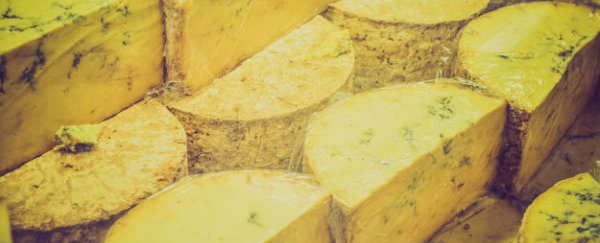Does cheese give you nightmares? Do different types of cheese give you different types of dreams? A study by the British Cheese Board investigated this, and let's just say the results included a vegetarian crocodile that was sad because it couldn't eat children.
No other food has quite the relationship with dreams that cheese does. Whenever we wake up from some sort of hyper-coloured landscape of flying hams and dog-headed monkeys dumping barrels of ice-cream and fear all over our boss's head, most of us will probably very quickly cast our minds back to the previous night's dinner and take stock of how much cheese was involved.
But does the assumption that cheese makes our dreams even more nutty than usual have any scientific merit? Strangely enough, not a whole lot of research has actually been done on the subject, but a fascinating study was carried out in 2005 by none other than the British Cheese Board. Because if their product is responsible for that one time someone dreamt that they forgot to return a library book and then a stomach with teeth and tiny legs ate their entire house in retribution, they'd like to be the first to know about it.
The first finding of the study was that no, eating cheese before bed won't increase your risk of having nightmares. The British Cheese Board team tested this by giving 100 male and 100 female participants 20 grams of cheese half an hour before they went to bed. This was done over the course of a week, and each participant was assigned to one of six types of British cheese - Stilton, Cheddar, Red Leicester, British Brie, Lancashire and Cheshire. The participants were asked to record everything they remembered about their dreams and how well they slept as soon as they woke up the next morning.
The team reported that 67 percent of the participants remembered their dreams, but not a single one could remember having a nightmare. Granted, the sample size is pretty small, but the British Cheese Board would have to be happy with that finding.
"The science of that, we think, is that there is an essential amino acid in milk called tryptophan," the secretary of the British Cheese Board, Nigel White, told Robert Siegel at NPR. "Now, tryptophan is known to be something which is helpful in normalising sleep and reducing stress levels. That seemed to make sense to us. What was really wacky was that the type of cheese that people were eating seemed to give them different types of dreams."
The study also found that around 85 percent of the female participants who were given a piece of Stilton before bed reported having super-crazy, vivid dreams, including "talking soft toys, a vegetarian crocodile upset because it could not eat children, dinner party guests being traded for camels, soldiers fighting with each other with kittens instead of guns, and a party in a lunatic asylum".
Red Leicester, on the other hand, was great for ensuring a good night's sleep, with 83 percent of the participants who ate it reporting that every night after a bit of Red Leicester was a good experience. And also a nostalgic one - 60 percent of the Red Leicester participants reported dreaming about fond memories of their childhood.
Other trends seemed to appear, such as Cheddar including dreams about celebrities, and over half of all nights slept by people eating crumbly Cheshire cheese were dreamless. While we'd love to see a much larger, peer-reviewed study on the topic, results like this sure are fun to think about.
"The Cheese and Dreams study conducted by the British Cheese Board is the first study of its kind and suggests that eating cheese before you go to bed may actually aid a good night's sleep," Neil Stanley, the UK-based director of sleep research at the University of Surrey's Medical Research Centre, who was not involved in the research, said in a press release. "What is particularly interesting is the reported effect different types of British cheese have on influencing the content of dreams. It seems that selecting the type of cheese you eat before bedtime may help determine the very nature of often colourful and vivid cheese induced dreams."
Sources: The British Cheese Board, NPR
